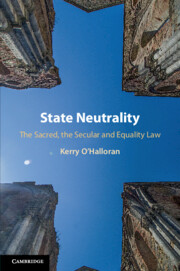Book contents
10 - Themes of Commonality and Difference
from Part III - Towards a More Stable Civil Society
Published online by Cambridge University Press: 15 January 2021
Summary
This chapter trawls through Part II material to trace patterns/trends of jurisdictional commonality and difference. It follows the structure of the jurisdiction-specific chapters, dealing in four sections with policy and legal framework; the interface between the church–state relationship and the fundamental human rights of religion, association and expression; the church–state relationship and equality rights in general; followed by church–state relationship and equality rights in the context of family matters, health, education, employment, service provision, national security and the migrant crisis. It identifies and examines governing principles emerging from national jurisprudence, which would appear to conform to established US precedents, distinguishing these from the more jurisdiction specific, and it considers those which have, or would seem to be acquiring, a wider international application.
Keywords
- Type
- Chapter
- Information
- State NeutralityThe Sacred, the Secular and Equality Law, pp. 449 - 479Publisher: Cambridge University PressPrint publication year: 2021

